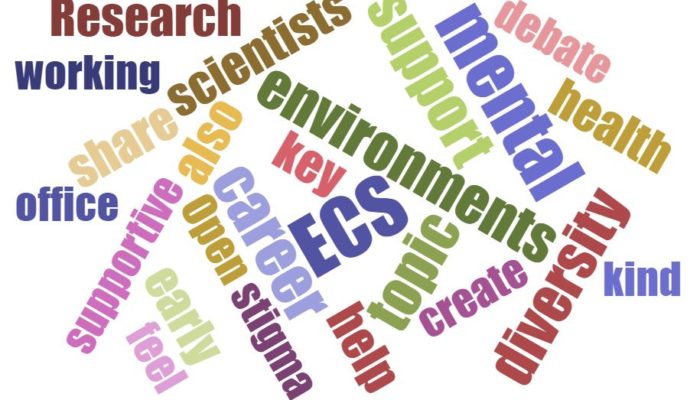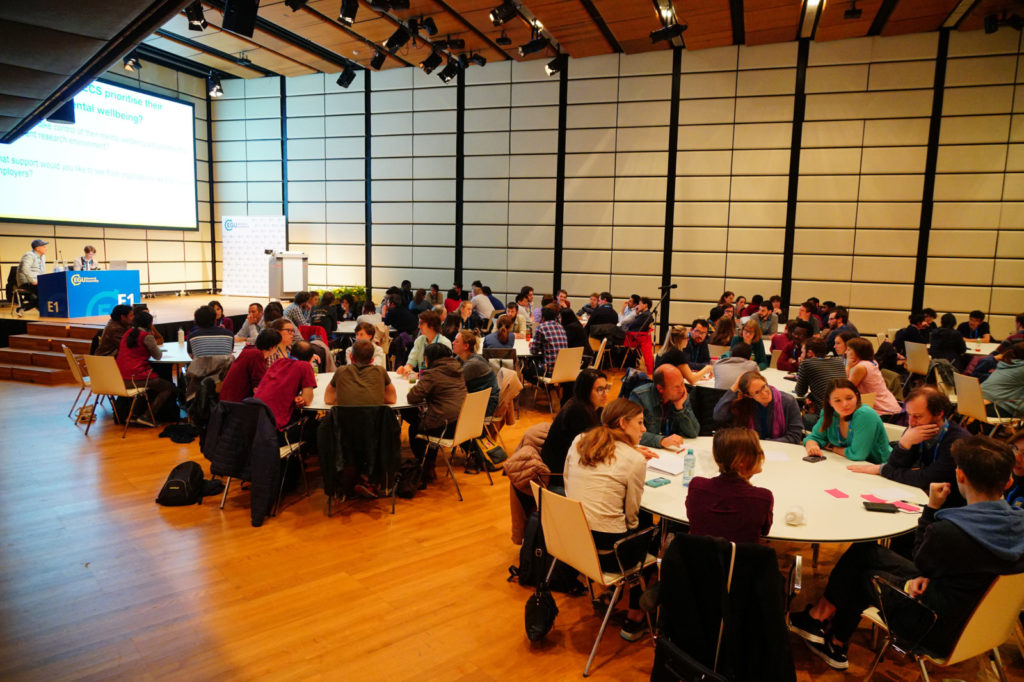
The EGU Early Career Scientists’ (ECS) Great Debates offer early career scientists at the EGU General Assembly the chance to network and voice their opinions on important topics in the format of round-table discussions. At the end of the debate, each table delivers a statement that summarises the discussion and recommendations. By publishing the results, we hope to highlight some of the needs of the EGU ECS community and how these matters should be addressed.
Early career scientists (ECS) demand more open and honest discussions around mental health in academia to combat stigma and create supportive environments – they also acknowledge that, while their own approaches are part of the change, assistance from the top is required as well.
At this year’s ECS Great Debate, the topic was mental wellbeing. The main question was “How can Early Career Scientists prioritise their mental wellbeing?”, which was discussed by almost 100 participants – mostly ECS but this topic is relevant to everyone. To guide our debate of this very broad topic we focused on two aspects:
- What can ECS do themselves
- What support would ECS like to see from institutions
Even though this is a very personal topic, we could have discussed both aspects all night, and in fact just having the topic in the General Assembly programme sparked debates during the week. I’m grateful that all participants debating this topic with us felt safe to share some very personal stories.

Early career scientists having round-table discussions on mental wellbeing in research and academia at the EGU General Assembly 2019.
Approximately one in four people will experience some form of mental illness in their lifetime – this number is even higher for PhD students, early career scientists and academics. This means it is time to discuss this aspect of research life more openly, not only to provide support but also to reduce the stigma around mental illness and ensure it does not turn into career enders. By openly discussing all aspects of research careers, we make certain that diversity is celebrated and ECS feel supported.
Increasing demands on researchers, highly competitive working environments, uncertain career paths and expected relocations were some of the challenges highlighted at the event that can impact ECS mental wellbeing. As ECS face these challenges, it is important to find ways to protect and care for oneself to ensure that mental health is not ignored and that ECS feel supported to seek help or guidance if they encounter mental health issues. The top tips from the ECS debating this topic can be summarised in three key themes:
- Be more than your research: have hobbies and find communities outside your lab or office. This helps to find perspective, get additional assistance or just to distract yourself. This can be difficult if you are new to a research group and have to relocate regularly. This is where online communities can be very helpful as they provide support and local knowledge irrespective of physical location.
- Be kind to yourself: selfcare is important, so know your limits and don’t fall down the trap of overworking; work smarter not harder. Take regular stock of your achievements, such as a DONE list rather than a To-Do list. It can be tempting to compete with your colleagues who is in the office first and who ends up staying the longest, but are all these hours productive? Figure out your best times to be productive and let the flexible working hours of academia work for you.
- Share with others and learn to be an ally: it’s ok to not be ok; we play a part in sharing this to help to create a more open, accepting environment. It’s not only about speaking openly about your own mental health but it’s also about listening without judgement when others share their experiences – this allows supportive environments to flourish. In this kind of space, everyone can feel comfortable to share their experiences, worries and fears, as well as celebrate successes, good practices and support.
These are big asks, and it was acknowledged that a supportive workspace environment is also key to allow researchers to look after their mental wellbeing. Institutions have a key role in creating and maintaining the right kind of working environment and office culture. Stigma around mental illness is probably the biggest barrier, and employers have to do more to both reduce the stigma and foster kind, safe and judgment-free office environments. Offering awareness training and handing out phone numbers for support or help lines is a start but not enough. ECS listed these things as key actions they would like to see implemented to create supportive environments:
- Specialised training and guidance for supervisors and managers: These kinds of workshops should not only teach employers how to identify needs and offer help but also how to raise awareness and create a more open working culture.
- Open discussions (such as coffee mornings or discussion groups) should be encouraged by institutions across all career stages to allow people to share their experiences.
- Celebration of available support: far too often finding guidance or the right person to talk to is a difficult task, especially when you are in crisis or difficult situation. Raising awareness and celebrating support programs provided by institutions and other organisations can make it easier for people to reach out and get help at the right time.
- Research culture changes: work environments that bolster and celebrate diversity are key for ensuring that ECS feel supported.
The overarching theme of the debate was that mental health management cannot be left to the individuals alone, but instead together we can all play our part in making sure our work environments become more accepting, less judgmental and truly value diversity.
By Stephanie Zihms, lecturer in researcher development, University of the West of Scotland, UK
If you are looking for someone to talk to or resources, here are some phone numbers and websites:
UK:
Samaritans: 08457 909090
Abuse Not: 0808 8005015
Brook Young People’s Information Service: 0800 0185023
Eating Disorder Support: 01494 793223
Anxiety UK: 0844 477 5774
Depression Alliance: 0845 123 23 20
Rape Crisis Centre: 01708 765200
Rape/sexual assault: 0808 8000 123 (female) or 0808 8000122 (male)
Miscarriage Association: 01924 200799
LLGS Helpline (LGBT): 0300 330 0630
Germany:
TelefonSeelsorge Deutschland: 0800 111 0 111 or 0800 11 0 222
https://www.telefonseelsorge.de/?q=node/6293
China:
Helpline 1: Beijing Suicide Research and Prevention Center Hotline: 800-810-1117 or 010-82951332
Helpline 2: Lifeline Shanghai: (english-speaking) (021) 6279 8990
Website: http://www.lifeline-shanghai.com
Helpline 3: Shanghai Mental Health Center: 021-64387250
Italy:
Helpline 1: 199 284 284
Website: http://www2.telefonoamico.it/
France:
Helpline 1: (+33) (0)9 51 11 61 30
Website: https://www.sos-amitie.org/
USA:
Lifeline: 13 11 14
Depression Hotline: 1-630-482-9696
Suicide Hotline: 1-800-784-8433
LifeLine: 1-800-273-8255
Trevor Project: 1-866-488-7386
Sexuality Support: 1-800-246-7743
Eating Disorders Hotline: 1-847-831-3438
Grief Support: 1-650-321-5272
Austria:
Helpline 1: 142
Website: http://www.telefonseelsorge.at/
Krisenhilfe: 0732 2177
Switzerland:
Die Dargebotene Hand (Schweiz) phone 143 or https://www.143.ch
Netherlands:
Helpline 1: 0900-0767
Website: https://www.deluisterlijn.nl/
Collection of helpline numbers around the world:
https://togetherweare-strong.tumblr.com/helpline
Coping tips:
https://www.rethink.org/diagnosis-treatment/symptoms/suicidal-thoughts/today
Resources to be a better ally:
https://www.time-to-change.org.uk
http://www.sane.org.uk
https://www.wie-gehts-dir.ch/de/




